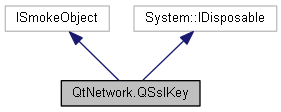The QSslKey class provides an interface for private and public keys.
More...
|
| override bool | Equals (object o) |
| |
| override int | GetHashCode () |
| |
| | QSslKey () |
| |
|
| |
| | QSslKey (QSslKey other) |
| |
|
| |
| | QSslKey (QByteArray encoded, QSsl.KeyAlgorithm algorithm, QSsl.EncodingFormat format=QSsl.EncodingFormat.Pem, QSsl.KeyType type=QSsl.KeyType.PrivateKey) |
| |
|
| |
| | QSslKey (QIODevice device, QSsl.KeyAlgorithm algorithm, QSsl.EncodingFormat format=QSsl.EncodingFormat.Pem, QSsl.KeyType type=QSsl.KeyType.PrivateKey) |
| |
|
| |
| | QSslKey (QByteArray encoded, QSsl.KeyAlgorithm algorithm, QSsl.EncodingFormat format, QSsl.KeyType type, QByteArray passPhrase) |
| |
|
| |
| | QSslKey (QIODevice device, QSsl.KeyAlgorithm algorithm, QSsl.EncodingFormat format, QSsl.KeyType type, QByteArray passPhrase) |
| |
|
| |
| virtual void | CreateProxy () |
| |
| new QSsl.KeyAlgorithm | Algorithm () |
| |
|
| |
| new void | Clear () |
| |
|
| |
| new bool | IsNull () |
| |
|
| |
| new int | Length () |
| |
|
| |
| new QByteArray | ToDer () |
| |
|
| |
| new QByteArray | ToDer (QByteArray passPhrase) |
| |
|
| |
| new QByteArray | ToPem () |
| |
|
| |
| new QByteArray | ToPem (QByteArray passPhrase) |
| |
|
| |
| new QSsl.KeyType | Type () |
| |
|
| |
| new void | Dispose () |
| |
The QSslKey class provides an interface for private and public keys.
QSslKey provides a simple API for managing keys.
See also QSslSocket, QSslCertificate, and QSslCipher.
| QtNetwork.QSslKey.QSslKey |
( |
System.Type |
dummy | ) |
|
|
protected |
| QtNetwork.QSslKey.QSslKey |
( |
| ) |
|
Constructs a null key.
See also isNull().
| QtNetwork.QSslKey.QSslKey |
( |
QSslKey |
other | ) |
|
Constructs an identical copy of other.
Constructs a null key.
See also isNull().
Constructs a null key.
See also isNull().
Constructs a null key.
See also isNull().
Constructs a null key.
See also isNull().
Returns the key algorithm.
| new void QtNetwork.QSslKey.Clear |
( |
| ) |
|
Clears the contents of this key, making it a null key.
See also isNull().
| virtual void QtNetwork.QSslKey.CreateProxy |
( |
| ) |
|
|
virtual |
| new void QtNetwork.QSslKey.Dispose |
( |
| ) |
|
| override bool QtNetwork.QSslKey.Equals |
( |
object |
o | ) |
|
| override int QtNetwork.QSslKey.GetHashCode |
( |
| ) |
|
| new bool QtNetwork.QSslKey.IsNull |
( |
| ) |
|
Returns true if this is a null key; otherwise false.
See also clear().
| new int QtNetwork.QSslKey.Length |
( |
| ) |
|
Returns the length of the key in bits, or -1 if the key is null.
| static bool QtNetwork.QSslKey.operator!= |
( |
QSslKey |
arg1, |
|
|
QSslKey |
arg2 |
|
) |
| |
|
static |
Returns true if this key is not equal to key other; otherwise returns false.
| static bool QtNetwork.QSslKey.operator== |
( |
QSslKey |
arg1, |
|
|
QSslKey |
arg2 |
|
) |
| |
|
static |
Returns true if this key is equal to other; otherwise returns false.
Returns the key in DER encoding. The result is encrypted with passPhrase if the key is a private key and passPhrase is non-empty.
Returns the key in DER encoding. The result is encrypted with passPhrase if the key is a private key and passPhrase is non-empty.
Returns the key in PEM encoding. The result is encrypted with passPhrase if the key is a private key and passPhrase is non-empty.
Returns the key in PEM encoding. The result is encrypted with passPhrase if the key is a private key and passPhrase is non-empty.
Returns the type of the key (i.e., PublicKey or PrivateKey).
| SmokeInvocation QtNetwork.QSslKey.interceptor |
|
protected |
| virtual System.IntPtr QtNetwork.QSslKey.SmokeObject |
|
getset |

